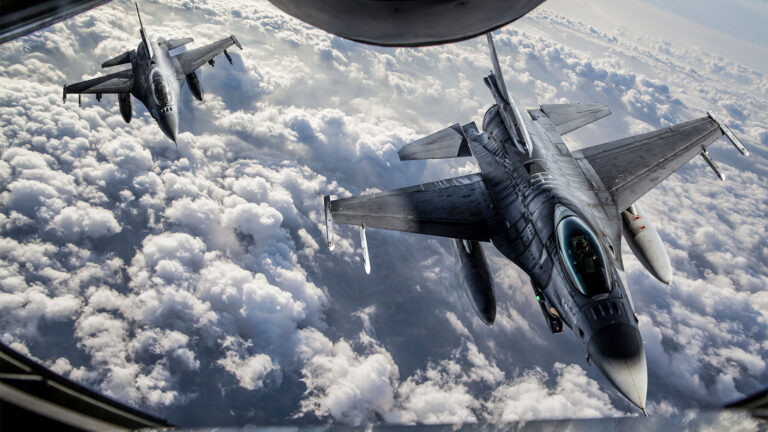Stay Up to Date
Submit your email address to receive the latest industry and Aerospace America news.
AIAA Announces Candidates for 2024 Election
The Council Nominating Committee has selected candidates for next year’s openings on the AIAA Council of Directors. Elections will be held January/February 2024. Council Nominating Committee Chair Laura Richard and AIAA Governance and Executive Operations Administrator Susan Silva confirmed the names of the candidates who will appear on the 2024 ballot.
Integration and Outreach Activities Division
Director–Elect Young Professional Group
Taylor Fazzini, Northrop Grumman Aeronautics Systems
Regional Engagement Activities Division
Director–Region III
Peggy Cornell, NASA Glenn Research Center
Director–Region VI
Cristian Calugarita, BijuSoft
Oleg Yakimenko, Naval Postgraduate School
Technical Activities Division
Director–Aerospace Design and Structures Group
Dawn Phillips, NASA Marshall Space Flight Center
Masoud Rais-Rohani, University of Maine
Director–Aerospace Sciences Group
Christopher Cotting, EpiSys Science, Inc.
Martiqua Post, NASA
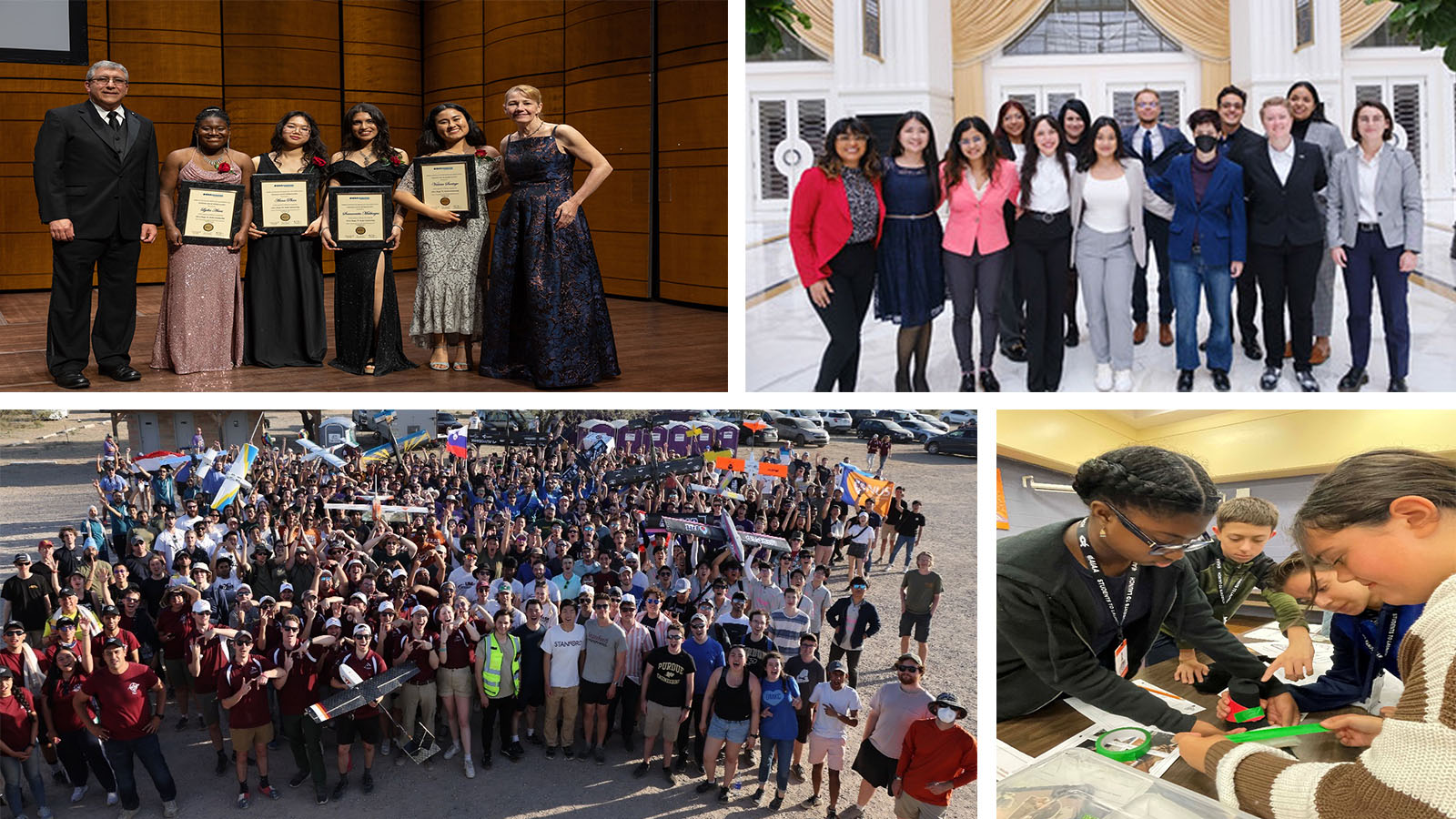
Making an Impact: Invest in the Future of Aerospace
The AIAA Foundation has been igniting students’ interest in aerospace for over 25 years. Educator awards and grants provide K-12 educators with the resources they need to foster enthusiasm for aerospace in their classrooms. At the university level, the Foundation provides real-world experience through student conferences, the Diversity Scholars Program, design competitions, and Design/Build/Fly, as well as awarding over $100,000 in scholarships and graduate awards.
In 2023 the AIAA Foundation proudly supported:
• 644 university students at seven Regional Student Conferences
• 58 university students through the Diversity Scholars Program at 2022 ASCEND, AIAA SciTech Forum, and AIAA AVIATION Forum
• 2,565 university students through Design/Build/Fly and Design Competitions
• $100,000 in scholarships and graduate awards
• $75,000 in K-12 educator grants and awards
Our new K-12 partnerships are having a significant impact.
• The ExGen program, a partnership with Estes Rockets and the National Science Teaching Association (NSTA), provides K-12 educators with free, engaging classroom-ready lessons and curriculum storylines to immerse students in real-life applications of STEM while exploring various concepts in aerospace, engineering, and rocketry and has influenced 540,000 K-12 students.
• Students To Launch (S2L), a partnership with First Light, Griffin Communications Group, and Oregon State University, inspires middle and high school students with the wonders of space. S2L invites students from underrepresented and underserved communities to engage in NASA mission-inspired events – from hands-on afterschool activities to attending rocket launches at NASA Kennedy Space Center – and has influenced 21,888 middle school students.
On Giving Tuesday, please consider helping us reach our goal of raising $75,000 to develop the next generation of aerospace leaders. With your support, we are looking forward to making an even bigger impact next year! Donate at aiaa.org/foundation.
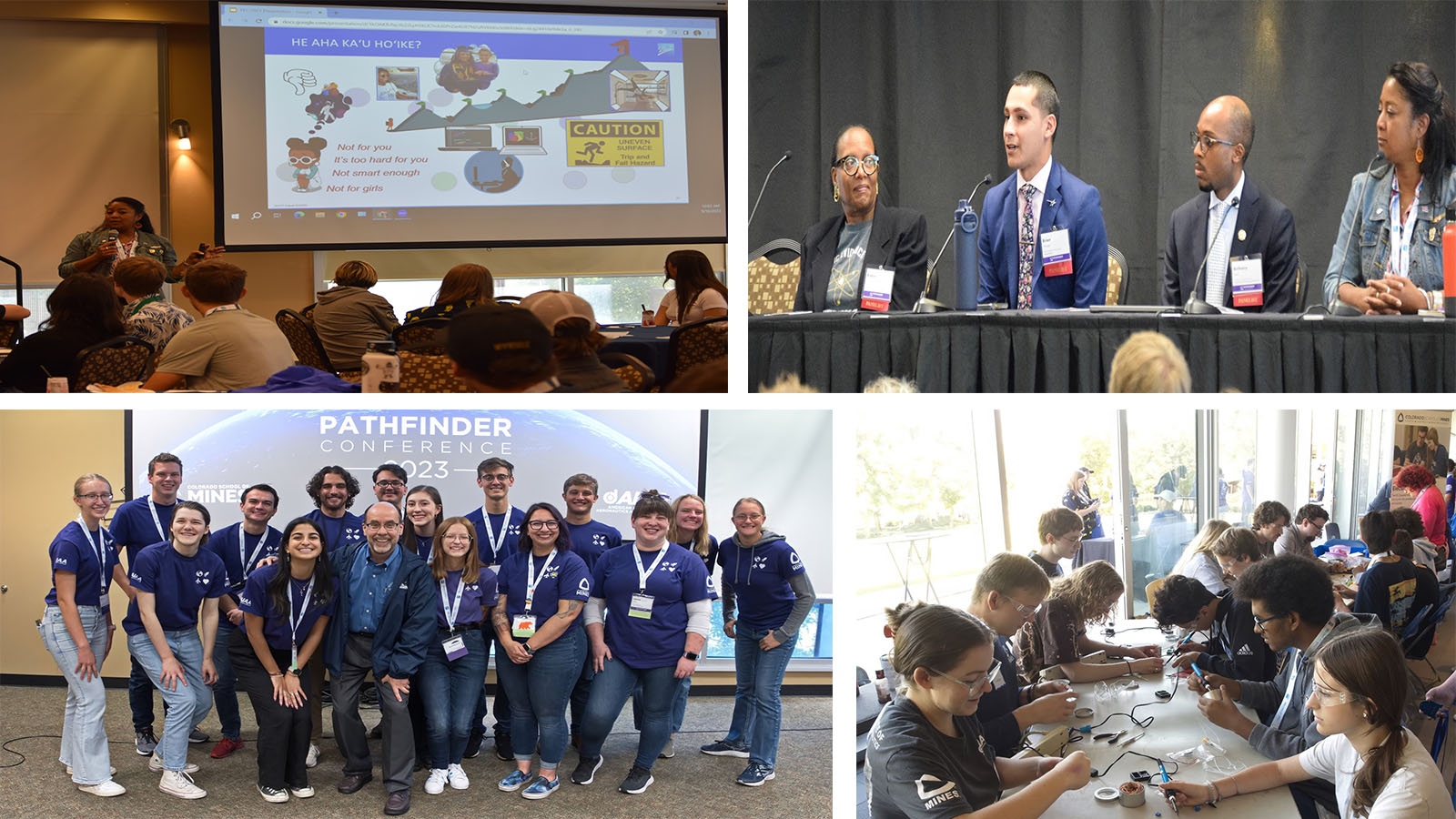
The Many Paths to Aerospace
The AIAA Colorado School of Mines Student Branch hosted the Pathfinder Conference on 16 September. This free event was conceived to enlighten students from diverse backgrounds about the myriad career opportunities in the aerospace sector. About 100 students from community colleges and high schools throughout Colorado attended.
A highlight of the conference was a panel discussion titled “The Many Paths to Aerospace,” including Robin Bruce, president of the Colorado Council of Black Nurses; Anthony Clark, assistant director of Scholarship Programs at the Organization of Black Aerospace Professionals; Zyola Mix, an opto-mechanical engineering technical specialist at Ball Aerospace; and Brian Ysasaga, a special programs systems integration and test engineer at Lockheed Martin. These professionals provided invaluable insights into their unique experiences as individuals from underrepresented communities in the aerospace domain and imparted advice to the attendees.
The day also featured an enlightening lecture by Abbud Madrid from the Colorado School of Mines’ Space Resources Center. He provided an overview of the center’s work and passionately encouraged the students to chase their dreams.
The Exhibit Hall featured a diverse range of industry stakeholders, academic institutions, and student organizations, all poised to share knowledge and opportunities in the aerospace industry. Among the exhibitors were Ursa Major Technologies, ULA, UCCS admissions, Spartan College, the Department of Electrical Engineering at the Colorado School of Mines, and the Colorado School of Mines chapter of NSBE. To foster engagement, students were provided with bingo cards, prompting them to interact with exhibitors and partake in various activities. The completed cards were eligible for entry into a raffle.
Feedback from the conference was overwhelmingly positive. We would like to extend our gratitude to the AIAA Rocky Mountain Section for awarding us the Diversity Grant, which played a significant role in making this event possible. We hope the section will continue to support such initiatives and spearhead the planning of this conference annually, enabling it to rotate among different campuses.
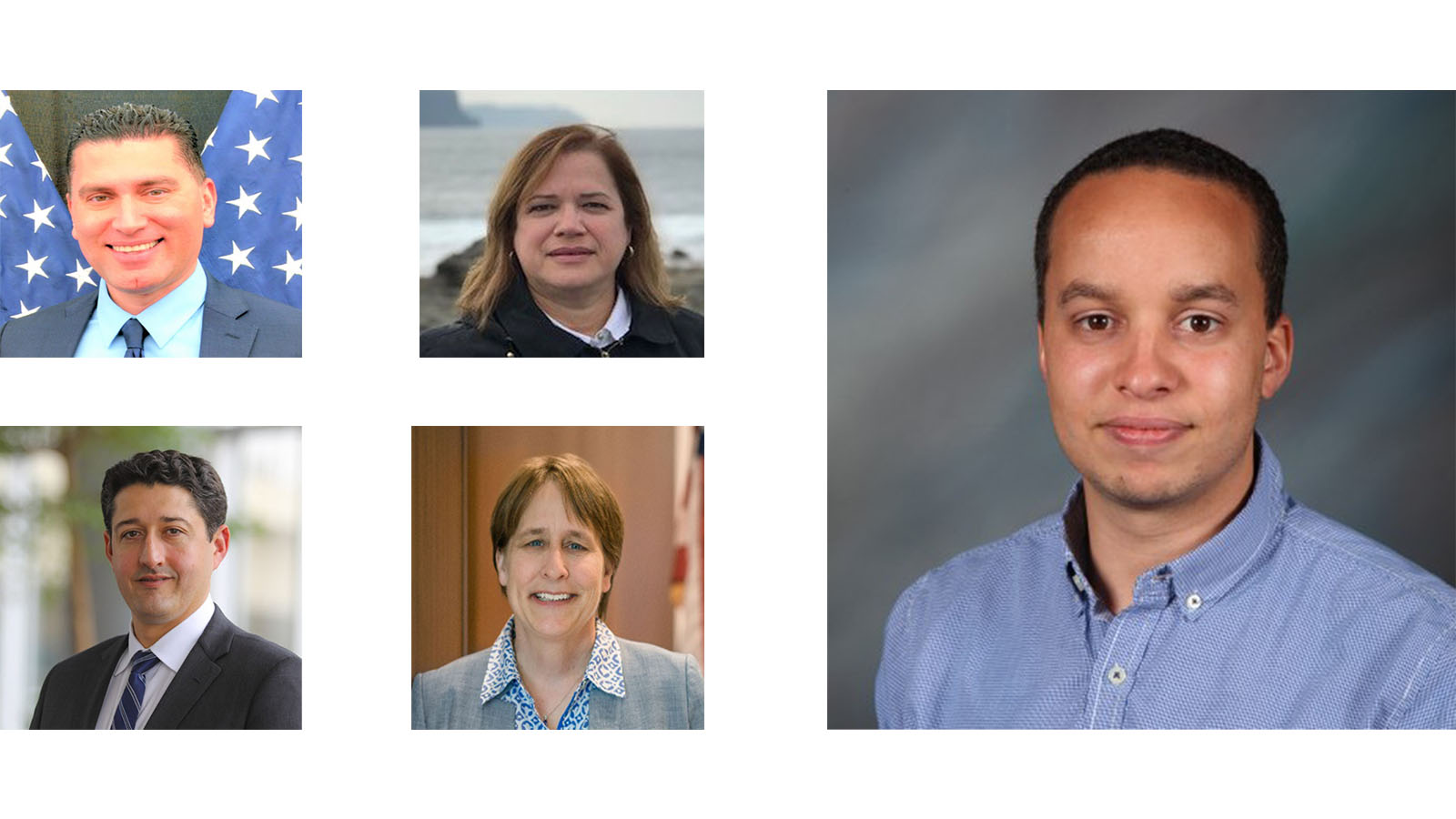
SAT OC and the U.S. Aerospace Workforce
By: Amir S. Gohardani, SAT OC Chair
In addition to exploring the use of aerospace technology for the benefit of society, the AIAA Society and Aerospace Technology Outreach Committee (SAT OC) is also examining the relationship and influence that society, culture, and the arts have on aerospace technology. In a new event on 16 November, AIAA and SAT OC will collaborate to host a free webinar on the U.S. aerospace workforce. The global workforce has changed significantly over the past few years, and we’ll explore some of the challenges and opportunities. Against a COVID-19 pandemic backdrop and changes in the aerospace sector, conversations about the aerospace workforce are more important than ever. Moderated by Amir Gohardani, vice president and Space Thought Leader, Deloitte, the session features Digna Carballosa, Talent Services Director, NASA; Mike French, vice president for Space Systems, Aerospace Industries Association (AIA); and Janet W. Grondin, chief executive officer, Stellar Solutions.
More information can be found at: aiaa.org/SciTech/program under What’s New on the dropdown menu.
Diversity Corner
Name: Daniel Perez (AIAA Young Professional Member)
Notable Contributions: Perez is a Senior Principal Test Engineer at Northrop Grumman. Before coming to Northrop, he worked as a flight test engineer at NAVAIR. Perez holds a B.S. in Mechanical Engineering from Rochester Institute of Technology and an M.S. in Aeronautics and Astronautics from Purdue University.
Potential Societal Impact of Contributions: Perez is working on different assignments that span the entire lifecycle of AARGM-ER missile program and other derivatives. Prior to this assignment, he worked at Northrop’s Palmdale facility as a System Test Engineer on all the different High Altitude Long Endurance UAV platforms, such as Global Hawk, Triton, and NATO AGS. At NAVAIR, he worked on F-35B, F-35C, and P8A. Perez has a strong background in flight test along with broad development and manufacturing experience in military aviation. He currently serves as the Defense Systems Sector Chair for the Adelante Employee Resource Group (ERG) (2021–2023) and participated in the company’s Mentoring Technical Protégé (MTP) program for the 2023 class.
*In collaboration with the AIAA Diversity and Inclusion Working Group and Claudine Phaire, the AIAA Society and Aerospace Technology Outreach Committee is highlighting prominent members of the wider aerospace community in the Diversity Corner.
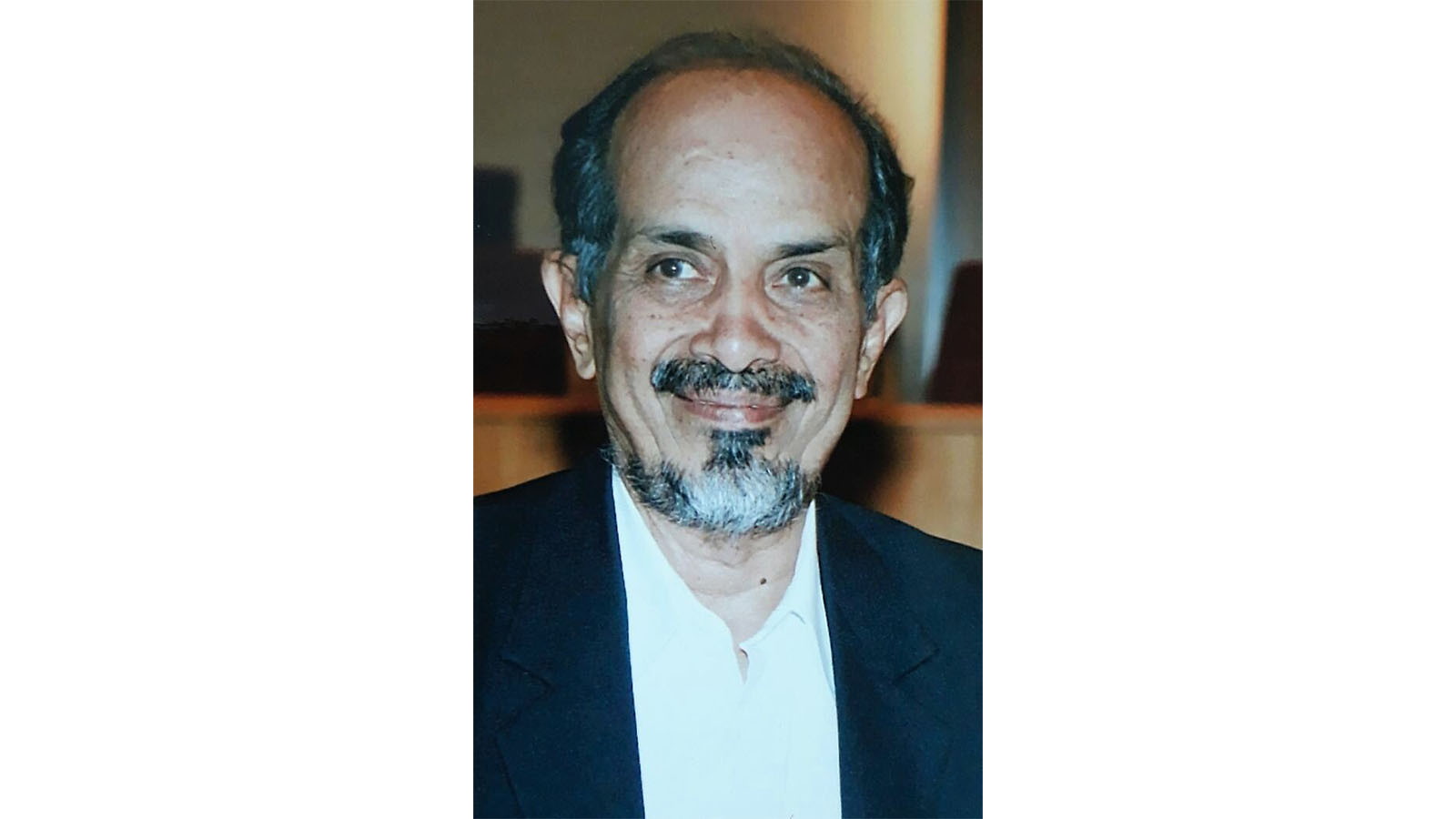
Correction
Indian aerospace and fluid dynamics scientist Roddam Narasimha’s AIAA membership level was incorrect in his obituary in the September issue of the AIAA Bulletin. He was elevated to AIAA Fellow in 1993. AIAA regrets the error and has updated the Aerospace America website with the correction information.
AIAA Associate Fellow Englar Died in March 2021
Robert (Bob) J. Englar, 76, died on 29 March 2021.
Englar earned a B.S. in Aerospace Engineering in 1967 from Virginia Polytechnic Institute. He served in the Virginia Polytechnic Institute ROTC guard and completed a co-opt internship with the U.S. Navy. In 1973, he earned an M.S. in Aerospace Engineering from the University of Maryland.
Englar worked for the Department of Navy, followed by the David Taylor Naval Ship Research and Development Center in Carderock, Maryland. He then worked at Lockheed Martin in Marietta, GA, and Georgia Institute of Technology Research Institute (GTRI). He had over 44+ years of experience in aerodynamic research, much of it was circulation control related, advanced concept development, and experimental techniques.
Englar was a Principal Research Engineer at GTRI and was responsible for research project direction and development of advanced technologies in aerodynamics. He had originated, conducted, and/or directed over 134 such sponsored research programs at GTRI since January 1989. He was Principal Investigator leading a NASA program on circulation control aerodynamics for subsonic fixed-wing aircraft and a co-investigator on a NASA program on pneumatic powered lift aircraft. He held 11 patents and 19 invention disclosures on these advanced concepts and published 209 papers and technical reports. He also taught senior design courses in the Georgia Tech Aerospace Engineering and Mechanical Engineering Schools.
An AIAA Associate Fellow, Englar was a founding member of the AIAA Applied Aerodynamics Technical Committee. He was elected AIAA Young Engineer/Scientist of the Year for his work on circulation control wing (CCW), received numerous professional awards, and lectured on the subject of powered lift and advanced concepts to government agencies, technical societies, private industry, and universities.
He was elected as a GTRI Technical Fellow because of his involvement with advanced aerodynamics and related advanced concepts. He led the development of advanced CCW airfoils and other pneumatic concepts, including full-scale flight testing of the A-6/CCW STOL Demonstrator aircraft. After retiring in 2013, Englar continued to act as Advanced Aerodynamics Consultant, particularly in the development of advanced pneumatic aerodynamic technologies for ground and water-based vehicles as well as advanced STOL and high-performance aircraft.
He led the revival of the Willard Custer Channel Wing for wind tunnel experiments directing airflow, a study that was funded by NASA and for which he was featured in Air & Space Magazine, and recently co-authored the book History of the Channel Wing with Joel Custer, the grandson of the original developer, Willard Custer. He also worked as a consultant on the X-plane project DARPA – CRANE (Control of Revolutionary Aircraft with Novel Effectors).
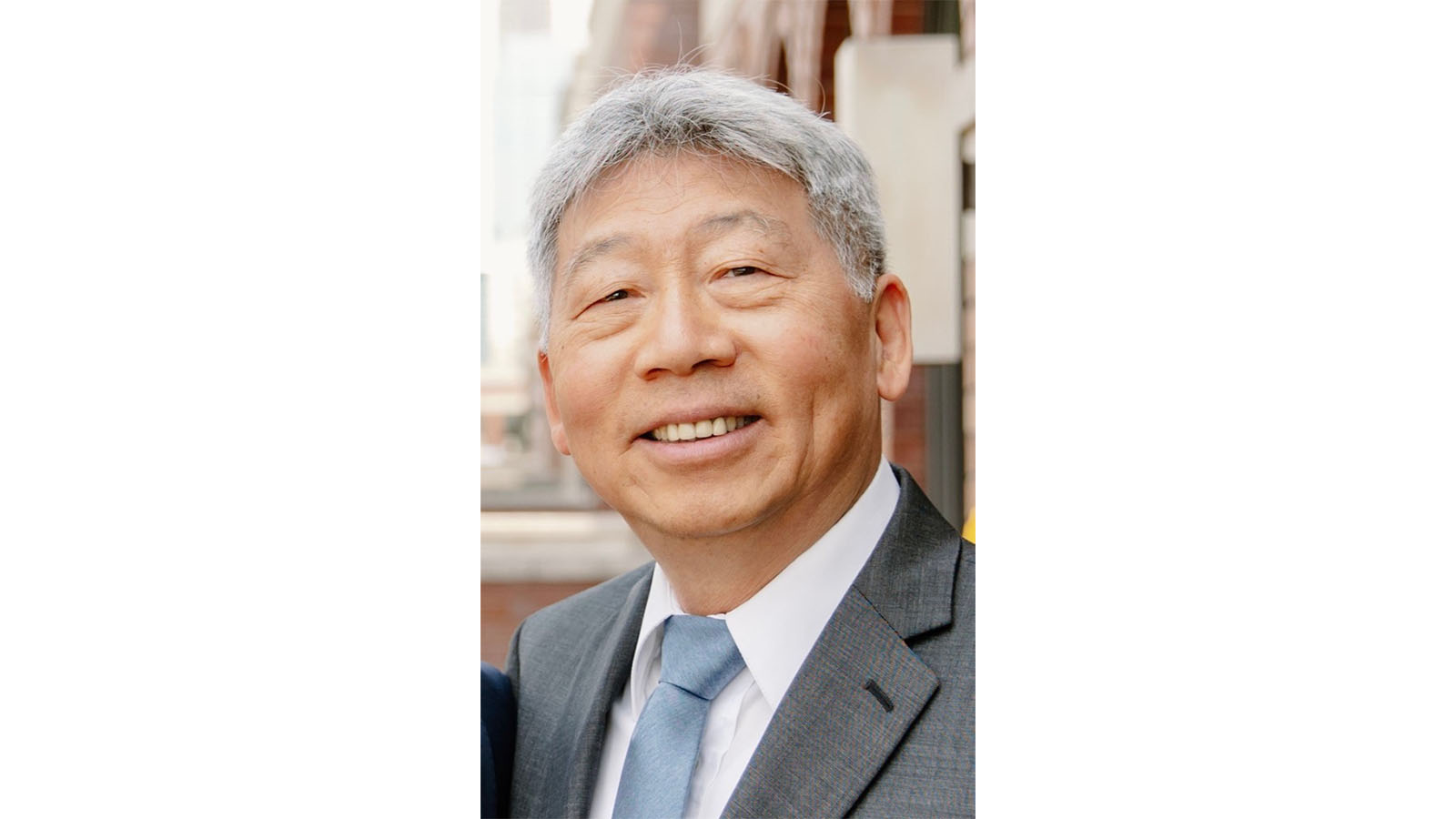
AIAA Associate Fellow Chang Died in October
Ming Chang, AIAA Aeronautics Domain Lead, died 1 October. He was 69 years old.
After spending most of his childhood in Hong Kong and Brazil, Chang immigrated to the United States, and attended college at the Polytechnic Institute of New York, where he received his bachelor’s degree in aerospace engineering. Chang worked for Boeing for a short period of time before pursuing his master’s degree in aerospace engineering at Cornell University, graduating in 1981. Chang then accepted a job as an aerospace engineer at Lockheed Corporation.
Between 1991 and 1994, he worked for Martin Marietta and Northrop Grumman before returning to work at Lockheed Martin in 1994. Chang excelled within Lockheed Martin where he assumed various roles, starting as an aerospace engineer associate and later managing the Aero, Acoustics and CFD group. He also was the Flight Sciences IPT lead for the JASSM (Joint Air-to-Surface Standoff Missile) and Nano UAV program. He was a Lockheed Martin Fellow specializing in Aeronautics. In that capacity he managed flow control programs for drag reduction such as plasma flow control and the Air Force Research Laboratory engineered surfaces, materials, and coatings (ESMC) program.
In December 2017, Chang started a position as a senior director at General Atomics in San Diego. His responsibilities included working on the Predator product line, developing real time pilot-in-the-loop simulations for handling qualities assessment, assembling the company’s first remote flight test control room for Predator flight test monitoring and participation, and developing capture strategies for CRADS such as ASAPTR and SkyBorg programs. He retired in 2021 as Senior Director of Flight Technologies, overseeing aero, propulsion, CFD, and flight controls/GNC activities.
After he retired in 2021, he became the inaugural AIAA Aeronautics Domain Lead, where he set Advanced Air Mobility, Carbon Emissions and Sustainability, Certification, and High-Speed Flight as key topics for the engagement of volunteer-led domain task forces and external programming opportunities.
An AIAA Associate Fellow, Chang was also a member of the AIAA Applied Aerodynamics Technical Committee for six years. In his position as Aeronautics Domain Lead, he was the chair of the 2023 AIAA AVIATION Forum Guiding Coalition.
2023 Best Professional and Student Papers
AIAA technical committees (TCs) and integration and outreach committees (IOCs) have selected the best professional and student technical papers presented at recent AIAA forums. With a standard award criteria and selection process from the respective committees, the following technical papers were selected as the “best,” and the by were presented with a Certificate of Merit. The papers can be found online at the AIAA Aerospace Research Central (arc.aiaa.org), marked as “Best Paper.”
BEST PROFESSIONAL PAPERS
2021 AIAA Hybrid Rockets Best Paper
“Machine Learning Techniques for Flight Performance Prediction of Hybrid Rocket Engines” (AIAA 2021-3506) by Alessandro Zavoli, Paolo Maria Zolla, Lorenzo Federici, Mario Tindaro Migliorino, and Daniele Bianchi, Sapienza University of Rome
2021 AIAA International Space Planes and Hypersonic Systems & Technologies Best Paper
“Preliminary Study of Shock / Boundary-Layer Interactions Generated by a Sharp Fin Mounted Above a Flat Plate” (AIAA 2021-4118) by Dustin L. Otten, Lockheed Martin; and Frank K. Lu, University of Texas at Arlington
2021 AIAA Pressure Gain Combustion Best Paper
“Effects of Inlet Area Ratio on Operability of an Axial Air Inlet Rotating Detonation Combustor” (AIAA 2021-3676) by Joshua Shepard, Alexander Feleo, and Mirko Gamba, University of Michigan, Ann Arbor
2021 AIAA Propellants and Combustion Best Paper
“Modeling of Layered Ammonium Perchlorate Composite Propellant with Different Burning Rates” (AIAA 2021-1970) by Monique S. McClain, Purdue University; Brian T. Bojko, Naval Air Warfare Center Weapons Division; Simon Ray and Steven F. Son, Purdue University
2022 AIAA Aircraft Design Best Paper Award
“Comparison of Future Aviation Fuels to Minimize the Climate Impact of Commercial Aircraft” (AIAA 2022-3288) by P. Proesmans and R. Vos, Delft University of Technology
2022 AIAA Aircraft Operations Best Paper Award
“Identifying Common Coordination Procedures across Extensible Traffic Management (xTM) to Integrate xTM Operations into the National Airspace System” (AIAA 2022-3910) by Paul U. Lee, NASA Ames Research Center; Connie L. Brasil, Deborah L. Bakowski, Conrad Gabriel, San Jose State University; Mark Evans, ASRC Federal Data Solutions; and Ryan Chartrand, NASA Langley Research Center
2022 AIAA Electric Propulsion Best Paper
“Experimental Characterization of Wave-Induced Azimuthal Ion Velocities in a Hollow Cathode Plume” (AIAA 2022-1561) by Parker J. Roberts and Benjamin Jorns, University of Michigan, Ann Arbor; and Vernon Chaplin, Jet Propulsion Laboratory
2022 AIAA Electrified Aircraft Technology Best Paper
“Sizing and Analysis of a Lift-Plus-Cruise VTOL Aircraft with Electrified Propulsion Systems” (AIAA 2022-3513) by Imon Chakraborty and Aashutosh Aman Mishra, Auburn University
2022 AIAA Gas Turbine Engine Best Paper
“An Experimental Study on the Dynamic Ice Accretion Process over the Surfaces of the Rotating Fan Blades of an Aero-Engine Model” (AIAA 2022-2435) by Linchuan Tian, Linkai Li, Haiyang Hu, and Hui Hu, Iowa State University
2022 AIAA Guidance, Navigation and Control Best Paper
“On A Higher Order Method for Anonymous Feature Processing” (AIAA 2022-0606) by James S. McCabe, NASA Johnson Space Center
2022 AIAA High Speed Air Breathing Propulsion Best Paper
“From Thermal Choking to Inlet Buzz of Circular Scramjets in High-Enthalpy Flows” (AIAA 2022-0202) by Qili Liu and Li Qiao, Purdue University; and Kyungrae Kang and Hyungrok Do, Seoul National University
2022 AIAA Inlets Nozzles and Propulsion System Integration
Best Paper
“Summary of the 5th Propulsion Aerodynamics Workshop Nozzle Test Case: Heated Nozzle Exhaust Passing Over a Flim-cooled Plate” (AIAA 2022-0086) by Nicholas J. Georgiadis and Mark P. Wernet, NASA Glenn Research Center; Darrell S. Crowe, Air Force Research Laboratory; Carolyn D. Woeber and Kristen Karman-Shoemake, Cadence Design Systems; and Chad M. Winkler, The Boeing Company
2022 AIAA Intelligent Systems Best Paper
“Deep Reinforcement Learning for Autonomous Aerobraking Maneuver Planning” (AIAA 2022-2497) by Giusy Falcone and Zachary R. Putnam, University of Illinois Urbana-Champaign
2022 AIAA Joint Liquid Propulsion and Propellants and Combustion Best Paper Award
“Simultaneous OH, CH2O and flow field imaging of near blowoff dynamics” (AIAA 2022-2348) by Raghul Manosh Kumar, Subodh Adhikari, Benjamin L. Emerson, and Timothy C. Lieuwen, Georgia Institute of Technology; and Christopher A. Fugger, Special Energies, LLC
2022 AIAA Meshing, Visualization, and Computational Environments Best Paper Award
“Overlap Preservation Using Loosely-Coupled Boundary Conditions for Body-Fitted Structured Overset Grids” (AIAA 2022-0216) by Andrew M. Chuen, University of California Davis; and William M. Chan, NASA Ames Research Center
2022 AIAA Modeling and Simulation Best Paper Award
“Estimating Aircraft State from Surveillance Data Using Statistical Learning” (AIAA 2022-3424) by Cody Nichols, Federal Aviation Administration; and Tyler Cook, University of Central Oklahoma
2022 AIAA Modeling and Simulation Best Paper
“Just Noticeable Differences for Variations in Quasi-Steady Stall Buffet Model Parameters” (AIAA 2022-0510) by Arne Imbrechts, Coen C. de Visser, and Daan M. Pool, Technische Universiteit Delft Faculteit Luchtvaarten Ruimtevaarttechniek
2022 AIAA Multidisciplinary Design Optimization Best Paper
“Multidisciplinary design optimization with mixed categorical variables for aircraft design” (AIAA 2022-0082) by Paul Saves, Eric Nguyen Van, Nathalie Bartoli, Thierry Lefebvre, Chrostophe David, and Sébastien Defoort, ONERA, DTIS, Université de Toulouse; and Youssef Diouane and Joseph Morlier, ISAE-Supaero ONERA, DTIS, Université de Toulouse
2022 AIAA Pressure Gain Combustion Best Paper
“Flight Demonstration of Detonation Engine System Using Sounding Rocket S-520-31: Performance of Rotating Detonation Engine” (AIAA 2022-0232) by Keisuke Goto, Nagoya University; Ken Matsuoka, Koichi Matsuyama, Akira Kawasaki, Hiroaki Watanabe, Noboru Itouyama, Kazuki Ishihara, Valentin Buyakofu, Tomoyuki Noda, and Jiro Kasahara, Nagoya University; Akiko Matsuo, Keo University; Daisuke Nakata and Masaharu Uchiumi, Muroran Institute
2022 AIAA Sensor Systems and Information Fusion Best Paper
“Using Drone Swarms as Countermeasure of Radar Detection” (AIAA 2022-0855) by Claudia Conte, University of Naples Federico II; Sofia Verini Supplizi and Antonio Mele, Italian Air Force Academy; Giorgio de Alteriis, Giancarlo Rufino, and Domenico Accardo, University of Naples Federico II
2022 AIAA Small Satellite Best Paper Award
“On-orbit Rule-Based and Deep Learning Image Segmentation Strategies” (AIAA 2022-0646) by Shreeyam Kacker, Alex Meredith, Violet Felt, Joe Kusters, Hannah Tomio, and Kerri Cahoy, Massachusetts Institute of Technology
2022 AIAA Software Best Paper
“Automated Test Case Generation for the Verification of System and High-Level Software Requirements for Fly-by-Wire Platforms” (AIAA 2022-0254) by Reinhard Reichel, Christian Block, and Serkan Dikmen, University of Stuttgart
2022 AIAA Spacecraft Structures Best Paper
“Compressive Behavior of Isogrid Columns Fabricated with Bend-Forming” (AIAA 2022-2263) by Harsh Bhundiya, Fabien Royer, and Zack Cordero, Massachusetts Institute of Technology
2022 AIAA Systems Engineering Best Paper
“A Formal Approach to Identify Inconsistencies in Stakeholder Needs in the Context of Systems Engineering” (AIAA 2022-1469) by Hanumanthrao Kannan and Benajmin C. Jantzen, Virginia Polytechnic Institute and State University; and Bryan L. Mesmer, The University of Alabama in Huntsville
2022 Collier Aerospace HyperX Software Structures Best Paper Award
“A Study of Airframe Thermal Stresses for Hybrid Composite-Metallic Structure” (AIAA-2022-2605) by D. Scott Norwood, Scott Malaznik, Brandon M. Schneberger, Kevin M. Fuller, Jason A. Grant, Matthew T. Gill, and Jesse C. Long, Lockheed Martin Aeronautics Company; and Kevin S. Brown, Air Force Research Laboratory
2023 AIAA Applied Aerodynamics Best Paper Award
“GPU-accelerated simulations for eVTOL aerodynamic analysis” (AIAA 2023-2107) by Vito Pasquariello, Yannick Bunk, Sebastian Eberhardt, Pei-Hsuan Huang, Jan Matheis, and Matteo Ugolotti, Lilium GmbH; and Stefan Hickel, Delft University of Technology
2023 AIAA Fluid Dynamics Best Paper Award
“Rational Boolean Stabilization of Subgrid Models for Large Eddy Simulations” (AIAA 2023-2485) by Emilio E. Torres and Werner J. A. Dahm, Arizona State University
2023 AIAA Plasmadynamics and Lasers Best Paper Award
“Modeling Flame Speed Modification by Nanosecond Pulsed Discharges to Inform Experimental Design” (AIAA 2023-2056) by Colin A. Pavan and Carmen Guerra-Garcia, Massachusetts Institute of Technology
2023 AIAA Thermophysics Best Professional Paper Award
“Arc-jet Testing of Continuously Woven Aeroshells –Spiderweave– for Adaptable Deployable Entry Placement Technology” (AIAA 2022-3503) by Jonathan Morgan, Tahir Gökçen, and Paul Wercinski, NASA Ames Research Center
2023 AIAA/CEAS Aeroacoustics Best Paper Award
“Near-field measurements of stationary and rotating in-duct sound sources with pressure-sensitive paint” (AIAA-2022-3056) by Michael Hilfer, Maximilian Behn, Christian Klein, Thomas Ahlefeldt, and Ulf Tapken, German Aerospace Center; Lukas Katzenmeier, Airbus Defence and Space; Lars Koop and Lars Enghardt, German Aerospace Center
BEST STUDENT PAPERS AND STUDENT PAPER COMPETITIONS
2021 AIAA Hybrid Rockets Best Student Paper
“Swirl injection in hybrid PMMA combustion assessed by thermochemical imaging” (AIAA 2021-3513) by R. Mitchell Spearrin, Isabelle C. Sanders, Fabio A. Bendana, Nora G. Stacy, Kevin K. Schwarm, Fabio A. Bendana, Nora G. Stacy, and Kevin K. Schwarm, University of California, Los Angeles
2021 AIAA International Space Planes and Hypersonic Systems & Technologies Best Student Paper
“Aerothermal Uncertainty Quantification of Deployable Entry Technologies Using Multi-Fidelity Modeling” (AIAA 2021-4228) by Mario Santos and Serhat Hosder, Missouri University of Science and Technology; and Thomas K. West, NASA Langley Research Center
2022 AIAA Structural Dynamics Best Paper
“Hypersonic Fluid-Structure Interactions on a Compliant Clamped-Free Clamped-Free Panel Under the Influence of Static Shock Impingement” (AIAA 2022-0241) by Paulo B. Vasconcelos, Liam P. McQuellin, Krishna M. Talluru, and Andrew J. Neely, University of New South Wales
2022 AIAA Walter Lempert Best Student Paper
“Thomson and Collisional Regimes of In-Phase Coherent Microwave Scattering Off Small Plasma Objects” (AIAA 2022-1748) by Adam Patel, Apoorv Ranjan, Xingxing Wang, Mikhail Slipchenko, and Alexey Shashurin, Purdue University; and Mikhail N. Shneider, Princeton University
2022 AIAA Walter Lempert Best Student Paper, Honorable Mention
“Analysis of Screech Phenomena in a Mach 1.0 Jet with Linear Array Focused Laser Differential Interferometry” (AIAA 2022-1798) by Theron J. Price, Mark Gragston, and Phillip A. Kreth, University of Tennessee Space Institute
2022 AIAA Walter Lempert Best Student Paper, Honorable Mention
“Measurements of NH3 in a Shock Tube for Investigating the Chemical Kinetics of Rocket Propellants” (AIAA 2022-1875) by Sulaiman Alturaifi and Eric L. Petersen, Texas A&M University
2023 AIAA David Weaver Thermophysics Best Student Paper Award
“Assessment of Detailed Thermochemistry and Excitation Models for Shock-Heated Oxygen Mixtures” (AIAA 2022-3500) by Timothy T. Aiken and Iain D. Boyd, University of Colorado
2023 AIAA Guidance, Navigation and Control Graduate Student Paper Competition Winner
“Bayesian Active Sensing for Fault Estimation with Belief Space Tree Search” (AIAA 2023-0874) by James F. Ragan and Benjamin P. Riviere, California Institute of Technology
2023 AIAA Air Transportation Systems Best Student Paper
Award – 1st Place
“Noise- and Fuel-Minimal Departure Trajectory Optimization with Reinforcement Learning” (AIAA 2023-4215) by Chris Nguyen, James M. Shihua, Ka Yiu Hui, and Rhea P. Liem, Hong Kong University of Science and Technology
2023 AIAA Air Transportation Systems Best Student Paper Award – Runner Up
“Urban Air Mobility Network Distribution in Chicago Metropolitan Area” (AIAA 2023-3262) by Qilei Zhang and John H. Mott, Purdue University
2023 AIAA Computational Fluid Dynamics Student Paper Competition – 1st Place
“Nonlinear Nonmodal Analysis Of Hypersonic Flow Over Blunt Cones” (AIAA 2023-3420) by Anton Scholten, North Carolina State University; Pedro Paredes, National Institute of Aerospace; Meelan M. Choudhari, Fei Li, and Mark Carpenter, NASA Langley Research Center; and Michelle Bailey, The University of Arizona
2023 AIAA Computational Fluid Dynamics Student Paper Competition – 2nd Place
“A Hybrid Lattice Boltzmann – Navier-Stokes Method On Overset Grids” (AIAA 2023-3433) by Alexandre Suss, Ivan Mary, and Thomas Le Garrec, ONERA, Université Paris Saclay; and Simon Marié, Laboratoire DynFluid
2023 AIAA Computational Fluid Dynamics Student Paper Competition – 3rd Place
“Eigenvalue Sensitivity Computations For Linear Stability Theory” by Connor Klauss, University of Maryland; Pedro Paredes, National Institute of Aerospace; Meelan M. Choudhari, NASA Langley Research Center; Boris Diskin, National Institute of Aerospace; and James Baeder, University of Maryland
2023 AIAA Multidisciplinary Design Optimization Student Paper Competition Award – 1st Place
“High-dimensional uncertainty quantification usinggraph-accelerated non-intrusive polynomial chaos and activesubspace methods” (AIAA 2023-4264) by Bingran Wang, Nicholas C. Orndorff, Mark Sperry, and John T. Hwang, University of California, San Diego
2023 AIAA Multidisciplinary Design Optimization Student Paper Competition Award – Runner Up
“Model Reduction of Isogeometric Shell Structures For Large-Scale Design Optimization” (AIAA 2023-3720) by Sebastiaan P. van Schie and John T. Hwang, University of California, San Diego
2023 AIAA/CEAS Aeroacoustics Student Paper Competition
“Estimation of the relative balance between the rotor and the OGV broadband noise” (AIAA 2023-3208) by Ram Kumar Venkateswaran, Phillip Joseph, and Chaitanya C. Paruchuri, University of Southampton
2023 American Society for Composites Student Paper Award
“A Novel Anisotropic Hyper-viscoelastic Model for Predicting Fabric Draping Responses” (AIAA 2023-0522) by Qingxuann Wei, Purdue University
2023 Harry H. and Lois G. Hilton Student Paper Award in Structures
“Dynamic performance of hygro-thermal-mechanically preloaded variable stiffness composite fairing structures” (AIAA 2023-1322) by Giuseppe Sciascia, University of Limerick, Ireland
2023 Jefferson Goblet Student Paper Award
“Feature-Mapping Topology Optimization of a Wing-box with Geometric Constraints” (AIAA 2023-1271) by Hollis Smith, University of Connecticut
2023 Lockheed Martin Student Paper Award in Structures
“A Discontinuous-Galerkin, Lagrangian Thermo-chemo-mechanical Material Response Solver for the Analysis of Ablative Thermal Protection Systems” (AIAA 2023-0197) by Christopher Quinn and Daniel Pickard, Massachusetts Institute of Technology
2023 SwRI Student Paper Award in Non-Deterministic Approaches
“Optimally tensor-structured quadrature rule for uncertainty quantification” (AIAA 2023-0741) by Bingran Wang, University of California, San Diego
Stay Up to Date
Submit your email address to receive the latest industry and Aerospace America news.




